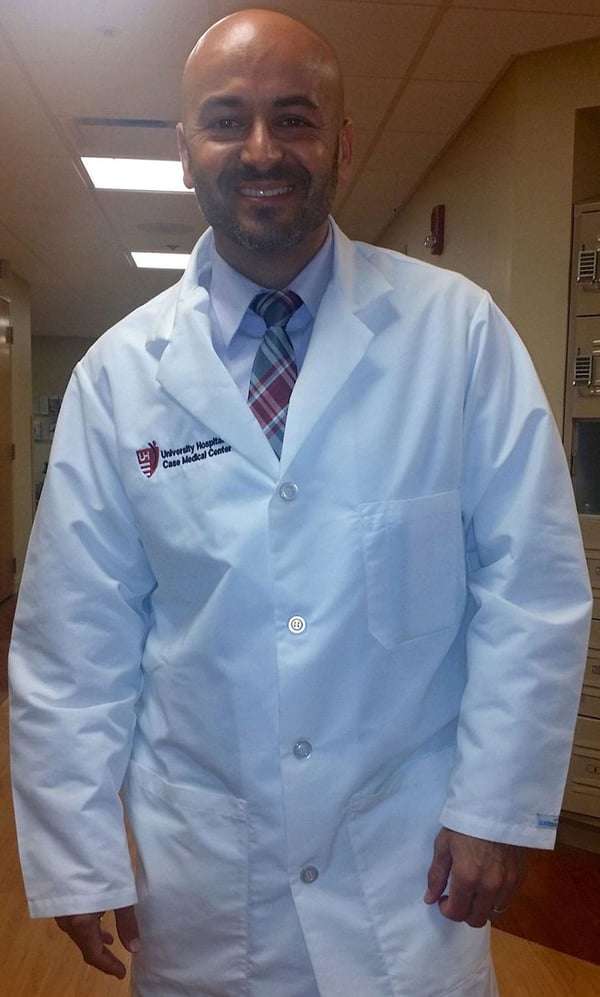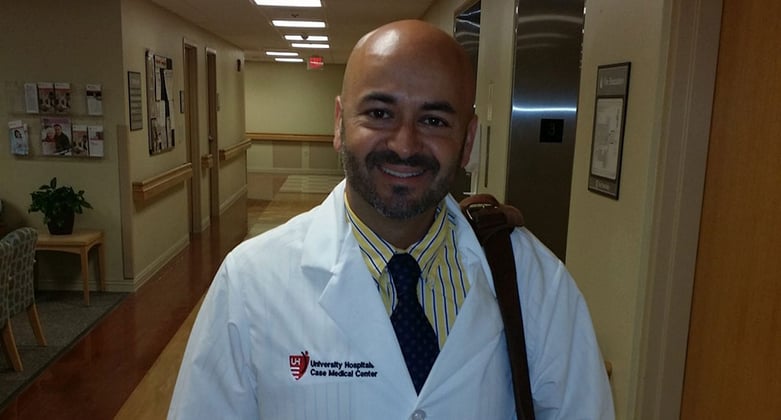
DR. AARON VAZQUEZ: 2015 UMHS graduate has been published in many prestigious medical journals. Dr. Vazquez is a psychiatry resident at Case Western University in Cleveland, OH. Photo: Courtesy of Dr. Aaron Vazquez
Editor’s Note: Publishing in medical school is possible and can really help students at American and Caribbean medical schools become better doctors. Dr. Vazquez is a strong advocate of getting published while still in medical school. He was one of the co-authors of an outpatient psychiatry study published in Psychotherapy Research in 2012, “Providing patient progress information and clinical support tools to therapists: Effects on patients at risk of treatment failure.”
In 2013, he co-authored an eating disorders study published in Psychotherapy Research, “Effects of providing patient progress feedback and clinical support tools to psychotherapists in an inpatient eating disorders treatment program: A randomized controlled study.”
He completed several exciting research projects with the Cleveland Clinic in 2014 while working as a Visiting Researcher in their Clinical Trials Department. This month, he published an article in the Augusta Medical Examiner about the positive role catharsis has on balancing a stressful life.
Dr. Vazquez is a 2015 UMHS graduate and a psychiatry resident at Case Western University in Cleveland, Ohio.
Tips for Medical Students Considering Research
By Aaron Vazquez, M.D.
Be humble. Admit to yourself you may know little about what you are about to embark on. Humility lends well to learning from mentors who know so much more about an area of medicine/research than you do. Strive to listen, learn and model after your mentors.
Be curious. Learning and discovering is a joy when you satisfy your own curiosities. Research is fun when you care. The sooner you know what type of residency you will be applying for, the better. Find out who the leaders are in "your" field. Yes, it is now "your" field, too. To guide your efforts in finding meaningful research experiences, it is helpful to know who writes the textbooks and publishes high-impact articles. Perhaps, your search will lead you to a future mentor who creates the diagnostic and/or treatment guidelines for a disease you are now interested in.
Be resourceful. Apply for summer research programs and inquire about research elective rotations. Acquire academic credit for your efforts when possible but don't exclude extracurricular research opportunities that would open future doors to you.
Be seen. Create a simple, yet professional profile on LinkedIn, Doximity and other networking sites. Search for research opportunities online. Make and keep friendships. There are many articles that aim to help doctors become social network competent if you are lacking in this area. Scrub any questionable content from your Facebook account. Attend scientific and medical specialty conferences for networking opportunities with other researchers.
Be willing. This is the most important step to landing a desirable research experience. Take the initiative to create opportunities for yourself. For example, be proactive during your lunch break and walk over to the office of the Principal Investigator. Introduce yourself and say, "I want to help." The importance of being proactive cannot be overstated. Woody Allen once said, "80 percent of success is showing up".
Be open. Already know beforehand what time commitments you can make and any limitations you have. Communicate those clearly. State what you have to offer the team. When appropriate, communicate your expectations (how the research opportunity will benefit you). Aim for co-authorship, meaningful involvement, a letter of recommendation, and a new network of relationships to give you an advantage for attaining residency later in your career.
Be flexible. If you can negotiate pay, that's wonderful. If not, still take the research opportunity and chalk it up to "paying your dues." Lt. Col. Jimmy Doolittle once said: “There's nothing stronger than the heart of a volunteer.” Because you are a medical student and your responsibilities will change with each preceptor, flexibility will favor you as well. If you are not paid, you are more likely to have the flexibility you need to juggle all of your commitments.
Be awesome. Under-promise and over-deliver when performing your responsibilities. Be a positive force that will benefit the team. Lighten as many loads for others as you can. Remember, you represent more than yourself. You will open or close doors for other colleagues that follow based on the reputation you leave behind.
Tips for Medical Students Wanting to Publish
Decide on the publication type for which you are hoping to publish. You may decide to develop a newspaper article, case report, review paper, chart review, author basic science research, clinical trials, etc.
Decide on your time commitment (2 weeks, 4 weeks, 1 year). For example, case reports require less effort and require less time than publishing original research. Be alert to interesting cases and images while doing clinical rotations. Once you decide on your time commitment, narrowing down the publication type is much easier. Develop a good research idea, or hot medical topic to write about.
Decide on a mentor. Find a Principal Investigator that publishes in your field and is interested in your idea.
Decide on authorship with your mentor. In general, being a first author on one paper is more favorable than being a third author on two papers.
Decide where to publish. Discuss with your mentor the target journal possibilities. If you will be seeking out residency with an academic powerhouse, the journal you publish your work in matters.
Decide not to quit. Your articles and papers will get rejected. Learn from that. Revise them if necessary and resubmit them to a different journal/newspaper. Even if you do not publish your work, you can still pursue opportunities to do a poster and present your work at a conference.
Specific Examples of Where to Begin Publishing Now
Look at local newspapers first. After reading the paper, determine what section of the paper you might be likely to publish your article in. If the submission criteria are not readily available, locate the editor or publisher's contact information in order to acquire it. Publishing in the local newspaper about medical student life or trending medical topics can be a good way to get started without combing through large amounts of research data to validate your writings. If you live in Augusta, consider writing content for the Augusta Medical Examiner.
Augusta Medical Examiner
Website: http://augustarx.com/
Publisher and Editor Name: Daniel R. Pearson
Email Address: Dan@AugustaRx.com
Phone: (706) 860-5455
Address
P.O. Box 397
Augusta, GA 30903-0397
Consider writing an article for a journal, which is dedicated to medical students such as:
- Student BMJ, a monthly, international medical journal for medical students. http://student.bmj.com/
- In-Training, an online magazine for medical students that encourages discourse and relationships between medical students on the global stage. http://in-training.org/
- The American Medical Student Research Journal accepts submissions from candidates worldwide, of which a medical student is the primary author. http://amsrj.org/
Consider writing an opinion article for a national newspaper. The competition is steeper to get published because of a larger circulation than academic journals, but if you have something unique to say, it is well worth the effort. If a national newspaper picks up your article, it will be a significant leap forward in your professional pursuits.
References
Mabvuure, N. (2012) Twelve tips for introducing students to research and publishing: A medical student's perspective. Medical Teacher, 34(9):705-9. doi: 10.3109/0142159X.2012.684915
Contact Dr. Aaron Vazquez on Facebook at https://www.facebook.com/aaronlvazquez?fref=ts
(Top photo) Dr. Vazquez is a psychiatry resident at Case Western University in Cleveland, OH. Photo; Courtesy of Dr. Vazquez
About UMHS:
Built in the tradition of the best US universities, the University of Medicine and Health Sciencesfocuses on individual student attention, maintaining small class sizes and recruiting high-quality faculty. We call this unique approach, “personalized medical education,” and it’s what has led to our unprecedented 96% student retention rate, and outstanding residency placements across the US and Canada. UMHS is challenging everything you thought you knew about Caribbean medical schools.

Scott is Director of Digital Content & Alumni Communications Liaison at UMHS and editor of the UMHS Endeavour blog. When he's not writing about UMHS students, faculty, events, public health, alumni and UMHS research, he writes and edits Broadway theater reviews for a website he publishes in New York City, StageZine.com.















